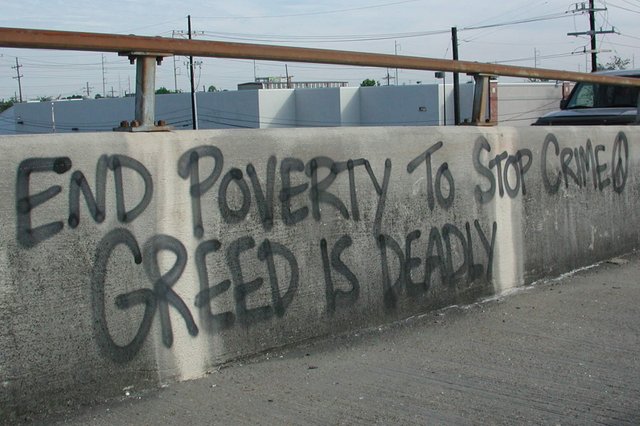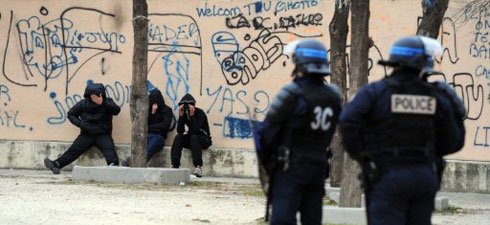Some people believe that crime is a result of social problems and poverty, others think that crime is a result of bad person's nature
Many people consider that innate characteristics are responsible for the fact that some people choose to turn to a career of crime. While I accept that crime may result from individual characteristics of violence or greed, I would argue that it is largely a consequence of social issues and poverty.

There is a belief that a person's nature determines whether or not they become a criminal. (1) Firstly, some argue that an individual who is cruel turns to crime more easily than a kind person. For instance, a child bullying other boys or girls at school may turn into a violent criminal in the future. (2) Secondly, bad characteristics such as laziness or selfishness could also breed future offenders, who seek to acquire easy money without working for it. A number of youngsters choose to steal from others, instead of working hard to make an honest living. These are strong reasons for thinking that those who have an inborn bad nature are more likely to break the law.

Nevertheless, it seems to me that social issues and poverty are the main causes behind crime. There are many problems in society which might lead to an increase in the crime rate. (1) For example, unemployment pushes people into resorting to crime because they simply cannot find a job. As a consequence, the number of offenders has climbed in many countries over recent decades. (2) Another reason is that, more broadly, poverty in general leads to a rise in crime. If people do not have enough money to make ends meet, they will be tempted to pursue illegal activities just to support themselves and their families.
In conclusion, although both views certainly have some validity, it seems to me that the principal causes of crime are a result of social conditions and problems. Thats it. @pakganern
read more👉👉 povertycausecrime
Related topics
https://www.poverties.org/blog/poverty-and-crime,http://www.nationaldialoguenetwork.org/poverty-and-crime/
If poverty causes crime explain rampant chicanery with wallstreet. Perhaps it could be argued that poverty is an aggravating factor in petty crimes but i would argue even that's not true.
The rich buy, sell, and use drugs at the same rates as the poor; but they certainly aren't arrested and jailed for it equivalently. The rich beat their spouses and kids. They drive drunk. And they steal; in many cases their stealing far exceeds anything an impoverished person could do.
Downvoting a post can decrease pending rewards and make it less visible. Common reasons:
Submit
Lets talk about culture and the rules that exist in a society, how we learn about those rules, and then how we interact with each other as individuals or as groups. And the idea here is that people who live in a society expect people to act certain ways, and that's what defines what a culture is. And that's what defines what a society is, people acting in ways that are expected. But many times people don't follow the rules. People act deviantly. They violate the norms that are expected of them. Here, we're going to be looking at why people violate these norms, and we're going to look at the consequences for people who violate these norms.
We're looking at something called deviance and crime, understanding the distinction between the two, and then we're going to look at the criminal justice system, which is the formal way of sanctioning people who commit crimes. Deviance describes behaviour by people who are violating the norms of their culture, people who are acting against those rules. Because deviance is socially defined and culture changes over time, deviance changes over time, or what is defined as deviant behaviour changes over time.
Think about the act of getting a tattoo. In some cultures getting a tattoo is expected. In fact, not having a tattoo would be seen as deviant in those cultures. In other cultures getting a tattoo is defined as a deviant behavior, and people who have a tattoo are seen as deviants. They're violating the social norms of that culture. Think about the American view of tattooing and how that has changed over time. In the 1950s and 60s people who had tattoos in America were seen as deviant. Just having a tattoo defined you as deviant. Nowadays people have a totally different view of tattoos, and it is becoming much more commonplace. The tattoo example is an excellent way of also looking at the distinction between formal deviance and informal deviance. Informal deviance are violations of cultural norms that are sanctioned or controlled by society but not by the government. So someone does something like get a tattoo, their mother may say, "I can't believe you got a tattoo." That's an informal sanction. It's not a crime to get a tattoo, but it's a deviant behavior, and we sanction that informally.
But in some states it actually was a crime to get a tattoo. In fact, in
And the idea here is we let them know that they are acting in a way that we believe is deviant. Formal social control represents the actions of the government. A government agency, a police agency, whose job it is to find people who are committing crime, to arrest them, and then take them into the criminal justice system, to isolate them from the rest of society, and then punish them or rehabilitate them. The formal social control mechanism that we typically study is called the criminal justice system. The criminal justice system is composed of the police, the court system, and the correctional system. The purpose of this system is to enforce the criminal code, the formal rules that the culture has created, to make sure that people follow the rules. All right, we've been talking about people who are violating norms. We've been talking about why people violate these norms, and there's whole sets of theories about why people commit crime or behave deviantly.
And we talked about the informal and social control mechanisms that try to coerce people to behave the way culture says people should behave.
Downvoting a post can decrease pending rewards and make it less visible. Common reasons:
Submit